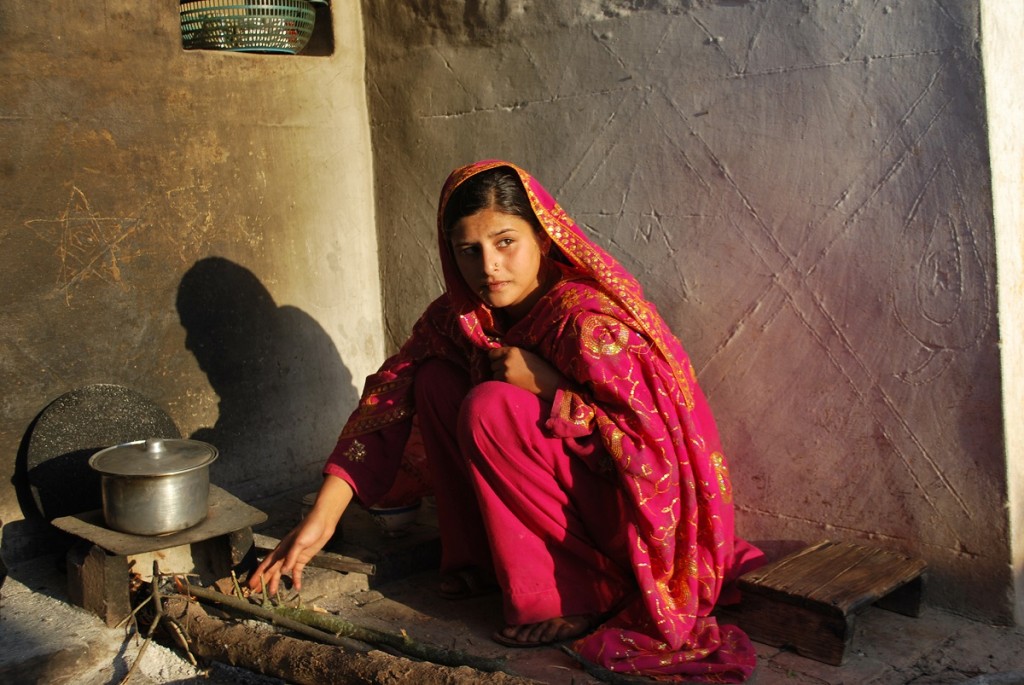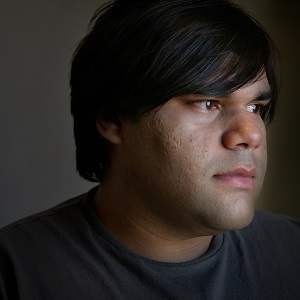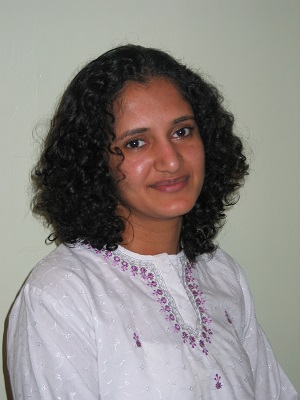Tribeca Interviews: ‘Among the Believers’ Questions If There’s A Way Out of Future Terrorist Attacks in Pakistan

Pictured: The heroine Zarina, married and expecting in the documentary “Among the Believers.” Photo: Adil Sheryar.
When teenage student Zarina escaped from the Red Mosque, she threw her mandatory burqa behind her. Staring defiantly into the camera, she said, “They are not Muslims, they are infidels,” explaining why she jumped off the back wall of the enclosed community, away from the politics that shadowed her love for Islam.
Among the Believers is a behind-the-scenes look at the Red Mosque, a controversial Islamic institution training thousands of students to wage jihad (holy war) against those who don’t agree with its conservative teachings. Co-directed by Hemal Trivedi and Mohammed “Mo” Ali Naqvi, this documentary chronicles how being on the conservative or moderate side of this ideological war has become a life or death situation. In the past decade, terrorist attacks in Pakistani cities have amassed to 50,000 deaths. The result of vigilante Islamic extremism has also internally displaced one million people, making them refugees in their own country.
Between 2009 and 2014, the camera follows Abdul Aziz Ghazi, the lead cleric for the Red Mosque as well as a staunch ISIS and Taliban supporter. Opposing him is Dr. Pervez Hoodbhoy, a physics professor and national security analyst, who believes that giving students books rather than guns is a more effective education. Caught in the crossfire are two teenage students, both of whom were 12 at the start of filming: Talha, a member of the Red Mosque, and the aforementioned Zarina, a student at a local school.
In Pakistan, Muslim beliefs can fall anywhere in the spectrum from conservative, to moderate, to non-practicing, just as there are variations in religions in other countries. An individual’s commitment to religion is not something to be patronized or underestimated; a spiritual journey is personal. But when innocent children are getting killed as a result of someone’s beliefs, the line has been crossed. So is there a solution in a country where Abdul Aziz says that the only way that peace can be achieved is if the Pakistani government upholds Shariah laws?
In the film, Dr. Pervez speaks to a group of protesters against the Red Mosque, saying that the main way to circumvent needless deaths is to bolster the education system. This means making schools where students learn mathematics and history, perhaps in combination with religion, more affordable. Without this change, the call of free education from the Red Mosque will continue to sound welcoming, rather than the community acknowledging the preparation for proselytizing hate and single-mindedness.
The co-directors’ coverage of five years of religious turmoil in Pakistan is comprehensive, it’s clear that much effort went into giving each side a voice. Although there is no blanket solution to this ideological war, a little comfort is provided knowing that as of Jan. 2015, Abdul Aziz has been placed under house arrest. Unfortunately for Zarina, the potential threat for her school to be bombed by religious zealots closes its doors, simultaneously ending her opportunity for a childhood. She is married and has her first child before the age of 14. Talha leaves the Red Mosque and is studying at another school, learning Arabic. For Talha, there luckily was an exit route, but for some there is only the reality of their finality. One Red Mosque protester’s sign says simply, “The smallest coffins are the heaviest.”
In the U.S., there’s a place we know similar to the Red Mosque where in exchange for behavioral restrictions, clothes are free, food is comped and there’s a roof over your head. It’s called jail. To be taught scripture without knowing the meaning behind the words breeds soldiers rather than students. In fact, ideological imprisonment may be worse than physical containment. Without external knowledge, malnourished free will may disappear altogether.
The day after Among the Believers had its Tribeca Film Festival premiere on April 17, I had the pleasure of meeting both Trivedi and Naqvi at the offices of Susan Norget Film Production, where we spoke about the film’s fundamentals.
GALO: How did the Red Mosque become the focus for this film, and where did you find so many varied perspectives about this conservative institution?

Director Mohammed Naqvi. Photo: Eric van den Brulle.
Mohammed “Mo” Ali Naqvi: Well, I am from Pakistan. I grew up in Karachi, so the Red Mosque for us was a very important point of contemporary history, especially in the last 15 years. The Red Mosque was this watershed incident in Pakistan, which really did divide the country in two. Rudimentary wise, on one side, you had the more extremist conservative people who kind of supported the Red Mosque and its activities, and then there are more moderates. Even for me to just say that is not necessarily fair, because ideologically, like any religion, there are people across the spectrum.
So the way this started was that my co-director, Hemal, she lost a friend of hers in the Mumbai terror attacks in 2008. She grew up with a very specific narrative about Pakistan. She’s from a conservative family and she’s from India, and the terrorist group that was found to be responsible for the Mumbai terrorist attacks was from Pakistan as well. So she wanted to investigate for herself why someone would do that, what were the origins of such hate? So that was the impetus for her to go into Pakistan, and she basically started investigating and came to realize that some of the biggest victims of terrorism are Pakistanis themselves, you know, and that’s true. That’s what I lived through growing up, especially the last 15 years.
I am, of course, a Muslim from Pakistan and when I decided to partner up and co-direct this film, it was very important that it not be polemic — that it actually be a proper understanding. Otherwise, what’s really popular in the media worldwide is this really blindsided dialogue, and I don’t think that actually advances everything.
To really fight extremism, you have to look at the just causes. As a Pakistani, I had already known about madrasas [an educational institution, sometimes with a religious component], and it’s important to see how this ideology plays out in education. And I think that when Hemal had come to Pakistan in 2009 and began production, she had visited this private school that was being run in this village. And in that, she met the village chief who runs the school and we actually started following several students. But Zarina, her story really popped because she was a striking girl, very brave at such a young age — and she actually ran away from the Red Mosque and that stuck out to us.
At the same time, we also visited the [Red Mosque] madrasa and when Hemal visited it, she disguised herself as a Muslim and she went with our co-producers Naziha Syed Ali and Syed Musharaf Shah. In fact, most of our team is indigenous Pakistanis. And they told her not to speak because the cleric of that branch would find her out. Upon returning to the madrasa, we decided upon Talha because he was this really sweet, nice boy — 11 years old when we started following him. And he was from a moderate Islamic family — a lower income bracket. Economics plays such a huge part in these children’s lives, and here’s an institution that’s offering their child an education: free schooling, free lodging, and free food, so it makes sense [to them].
But what’s coming through organically is the Red Mosque, that’s kind of the common factor amongst all of these people, right? So, when you say, how did you find all of these characters? It kind of just happened. We didn’t even know necessarily that we wanted to do a film on the Red Mosque; we just knew we wanted to do a film on the ideological divide that’s happening in Pakistan through education.
GALO: You know, I’m kind of surprised that Abdul Aziz would even welcome being filmed and say all of his opinions on camera, noting that in a shot of him walking around outside of the community, he’s surrounded by his armed followers. How did you get him to open up?
MN: Well, Aziz, I should point out, is very open to giving interviews and coming to the media. He does so for international media as well as Pakistani outlets. The difference is that we don’t just go for one entry, we follow him for five years. My experience with other documentaries, and this is my fifth film, is that they have really long production processes (four or five years).
Now within that period, of course, you form your own relationship with your subject — and for me, as a director, gaining that trust was also learning that he’s a very polarizing figure. The minute you meet him, there are very specific opinions you have about him because of what you know about him, and it was very important for me to divorce that, totally disassociate and really approach it genuinely to ask him questions about my spirituality. That led him to open up more, and eventually it grew from there.
GALO: I read in your director’s bio that reading the Quran was compulsory for you. Talha said he dedicated sunrise to sundown memorizing verses but didn’t know the meaning behind the messages. Did you relate to Talha’s experiences at all?
MN: Sure. I mean, I was never enrolled in a madrasa per se, but to the equivalent of Sunday school for kids here in semi-religious families that’s what my experience was. My friends and I, when we were growing up, we had to read the Quran. And that’s all I did — an imam [a cleric] would come twice a week, and I’d have an hour or two of reading the Quran. I had no idea what I was reading; I could phonetically read it.
So what was distilled to me with my spirituality at that time were really limiting and shallow beliefs that parroted: “don’t wear shorts” and “don’t make friends with anyone outside your faith.” It was really ridiculous. I told this to my parents and they were really shocked and said, “You’re not going to that cleric anymore.” But as a reaction, I compartmentalized my religious upbringing and it wasn’t really a thing for me until I was living here in New York and 9/11 happened. And for the first time, I had to become more aware that I was a young Muslim male in America. I have to say that this film really came back to investigating my own spirituality and, of course, it’s a lifelong journey, for me at least, delving into Islam, religion and the different manifestations of it. In this, we have Talha who is very devout, as well as Zarina who is devout, too — and yet they’re representing Islam in a very different form than someone like Aziz is. So, for me, that was pretty amazing.

Director Hemal Trivedi. Photo: Hemang Trivedi.
GALO: Hemal, Mo said that your friend had died in the 2008 Mumbai attacks. Is that what propelled you to say, “I have to make this film?”
HT: I grew up in India in a conservative Hindu family. And growing up, our culture does have this notion that Pakistan is the “other country” that is trying to destroy India. I grew up with that myth to “stay away from Pakistan.” It’s almost like Israel and Palestine, not that extreme but in the same length.
There were many attacks in Mumbai, but when they happened in 2008, I had a personal loss. At that time, I was so angry and I was so hateful. As an artist, I see my art as a medium of emotional quest, and I really wanted to make sense of my anger.
So I started digging deeper into my anger, asking myself where it’s coming from. Then I started communicating with Pakistani journalists, Pakistani media. For the first time, I started reading Pakistani newspapers, and I had never read Pakistani newspapers in my entire life. I went to Pakistani madrasas and neighborhoods, and then I learned that…well, there are many such attacks in Pakistan by the same extremist elements that carried out the attacks in Mumbai. So that’s when my anger turned into empathy. And this change of heart that I experienced is one of my emotions that I want the viewers of the film to take away. I want them to go through the same emotional journey that I went through. Of course, I went through this journey over five years, and it’s very hard to make it happen within 84 minutes.
GALO: As a viewer, I can tell you that it definitely felt like an emotional journey for me, especially regarding Zarina, who wanted an education but ended up having an arranged marriage. Can you tell me anything about where she ended up?
HT: She’s married and she has kids.
MN: Second kid now.
HT: She was pregnant the year after I was pregnant, so her kid must be a year old or something. But her life is better than her mother’s life. Her husband is not bad. Her husband is a typical South Asian husband. He’s nice, loves her, and admires her for her beauty — and Zarina is a very smart woman. Of course, she could not fulfill all her desires because she’s an ambitious woman as well, so now she’s hoping that her children will fulfill those dreams. And she’s also hoping that she will have fewer kids than her mother had.
GALO: I noticed that, too. Zarina had said that if her mother had fewer children, she would be a better mother. I think to have the fortitude to say that as a teenager about one’s own family was a very shocking insight.
HT: So with Zarina, after her marriage, we met her once or twice. And she said that [her husband’s] not bad. He buys her samosas every day and he admires her. And also, he doesn’t shout at her for her cooking. He doesn’t yell at her.
GALO: So she’s as happy as she can be.
HT: Yes, she’s as happy as she can be. And, you know, this is what I’ve noticed: it’s cultural. For example, if I look at my own life, my great-grandmother had 13 kids; she actually had 16 kids and three of them died because of malnutrition. My grandmother had eight kids, out of which two died. My mother had two kids, and I only have one kid. So it does skip generations. My mother had to fight to even go to school, and so she pushed me to go to school. My mother wanted me to be a doctor and I became a documentary filmmaker, now that’s a different kind of issue [laughs]. I just want my child to become whatever they want. Parents want their kids to have better chances.
GALO: Abdul Aziz described the current situation in Pakistan as “insanity, indecency, music.” In America, where music is celebrated, having it associated with such negative terms was surprising. Why do you think that was included?
MN: He’s referencing his interpretation of Islamic doctrine, which prohibits overindulgence in pleasure and the senses. Music, of course, falls into that because in his narrow-minded opinion, it awakens the beast within you to perpetuate and participate in vulgarity. So he’s coming from what a lot of monotheistic religions have, an old world piety and propensity toward being pure.
HT: And I’d like to add one thing to this. Mo asked him, “Why is music prohibited in Islam?” And he said it’s because music causes a heart to rebel.
GALO: Kind of in the vein of that, with technology, too, the students couldn’t watch sporting events. I think Talha wanted to watch cricket, and he said that he couldn’t because he would get yelled at or beaten if he was caught. Then we see Abdul Aziz showing off the official Red Mosque Facebook page. So how does that equate where leadership can bend the rules but students must follow them?
MN: Well, Aziz is very intelligent. He said we don’t have to cut all TV, but it has to be Islamic programming or news from an Islamic event.
HT: He says that as long as the television helps in promoting an Islamic message and proselytizing and spreading the image about Islam, it’s fine. So social media, he uses it in the same capacity.
GALO: Dr. Pervez is a professor at the Forman Christian College University in Lahore who vocally opposes the Red Mosque’s education tactics. He says that a well-rounded education is the only way to stop the suicide attacks, whereas Abdul Aziz says the only way peace will come is if Shariah law is followed. So do you see a solution ever coming if their views are so different?
MN: You cannot change by force anyone’s beliefs. We can’t get Aziz to start thinking something else. The only way to counteract them is to diffuse them. One way to do that, and perhaps the only way, is through education — books not bombs, that’s what it comes down to. Since Pakistan has joined the war on terror and has blown up certain areas, there is a visceral reaction to that. So what counteracts that is education, and giving children skills and mobility to have a better life — to have the social skills in the future to succeed, to get jobs. Otherwise, they’re stuck in that cycle of poverty and hate, and the choices are very limited.
Video courtesy of Among the Believers.
“Among the Believers” premiered on April 17 at the Tribeca Film Festival. The movie will be screened on Friday, April 24 and Sunday, April 26. Rush tickets are currently still available.










